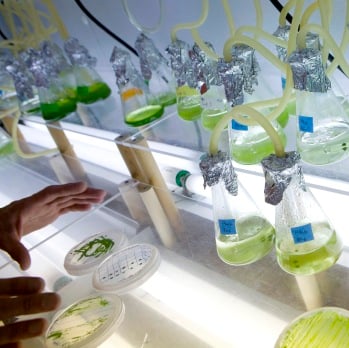 |
Today’s postdoctoral associates face challenges and opportunities as they make the transition from trainees to full-fledged scientists in a profession where the traditional career track is not as clear cut as in the past. That’s why the Graduate School of Biomedical Sciences (GSBS) established the Office of Postdoctoral Scholars in 2009, to promote, support and enhance postdoctoral training at UMass Medical School. “Our objectives are to be a resource for postdoctoral scholars, postdoctoral mentors and the institution at large,” said Anthony Imbalzano, PhD, professor of cell biology and associate dean for postdoctoral scholars.
Like research institutions everywhere, the GSBS relies on a workforce that includes, in addition to faculty, graduate students and other staff members, 367 postdoctoral associates who help advance research in 162 laboratories and programs. Better known as postdocs, postdoctoral associates have PhDs and are temporarily employed as they continue their training until they move on to positions of greater independence and stature. Working as a postdoc for several years has become a necessity to gain greater knowledge and experience, make professional connections and build a name in research circles, all essential steps in establishing scientific careers.
As was recently reiterated in a report from the National Institutes of Health exploring the career and workplace concerns of biomedical researchers, contemporary postdoctoral fellows are faced with a supply-and-demand bottleneck in the traditional employment pipeline that leads to a faculty appointment at an academic institution, leaving some postdocs in ’temporary’ jobs for upward of seven years or more. And while virtually all postdocs do eventually move on to other employment, many do so into positions other than as academic faculty and principal investigators.
“Very few postdocs are unemployed, but there are postdocs who spend too many years waiting for an opportunity,” agreed Dr. Imbalzano, who coordinates the office’s Professional Development Series to help postdocs evaluate and plan career options. Monthly programs explore a variety of career paths as well as provide practical knowledge about preparing for the post-postdoctoral job search. Past sessions have included “The Translation of Innovation from Academia to Industry” and “What does the NIH Look for in Tenure-track Investigators?” Other presentations have featured less conventional career paths, such as science journal editor and intellectual property lawyer. Practical skills such as “CV Basics: Documenting Research Accomplishments,” and “Optimizing Poster Presentations” are designed to help postdocs hone skills needed for success outside and inside the laboratory.
While the Professional Development Series is its most visible initiative, the office has done most of its work behind the scenes to improve and standardize policies for postdoctoral associates. Finalized in the summer of 2011, the updated Procedures and Practices Relevant to Postdoctoral Trainees spells out the maximum length of a postdoc appointment, specifies how postdocs may be promoted to either a research staff position or junior faculty position, and mandates training in research ethics for all UMMS postdocs. The office also promoted modification of postdoc benefits to make them equivalent to those of other non-faculty employees.
Past career development presentations can be viewed on the GSBS Intranet. The next program, “An academic position at a small college: Career death or just a different kind of career?” featuring Leonard A. Doerfler, PhD, professor of psychology at Assumption College and associate professor of psychiatry at UMMS, will be held on Monday, March 5, from 2:30 to 3:30 p.m. in Amphitheatre I.
Related links:
The Office for Postdoctoral Scholars